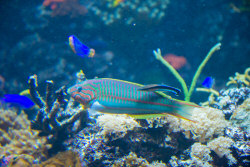Buying a Saltwater Aquarium: What You Need to Know
Buying a Marine Tank: Purchase the Biggest Tank You Can Afford to Buy
 If youíre a beginning aquarium enthusiast, then buying your first marine
aquarium is certainly a purchase you canít take lightly. Thatís because the tank
you choose will affect your choice of fish as well as their overall care and
maintenance. Usually, itís best to buy the largest sized tank that can either
fit into your aquarium space or into your budget. That way, youíll have more
alternatives when it comes to adding fish and including plants, coral and other
decorations. If youíre a beginning aquarium enthusiast, then buying your first marine
aquarium is certainly a purchase you canít take lightly. Thatís because the tank
you choose will affect your choice of fish as well as their overall care and
maintenance. Usually, itís best to buy the largest sized tank that can either
fit into your aquarium space or into your budget. That way, youíll have more
alternatives when it comes to adding fish and including plants, coral and other
decorations.
Start with a 40-Gallon Tank if Youíre a Beginning Aquarium Enthusiast
 Depending on your budget or available space then, the smallest tank you
should consider should be around 40 gallons (150 liters) in size. Donít make the
mistake, like many hobbyists, by picking too small of tank. Choosing a larger
tank will prevent you from having to transplant fish, plants, and tank
accessories into a bigger aquarium at a later date. In addition, if you fail to
buy a roomer marine tank, then youíll eventually have to buy new lights and
filters for the bigger aquarium as well. Depending on your budget or available space then, the smallest tank you
should consider should be around 40 gallons (150 liters) in size. Donít make the
mistake, like many hobbyists, by picking too small of tank. Choosing a larger
tank will prevent you from having to transplant fish, plants, and tank
accessories into a bigger aquarium at a later date. In addition, if you fail to
buy a roomer marine tank, then youíll eventually have to buy new lights and
filters for the bigger aquarium as well.
Keep the Fish Count Lower to Ensure Survival
 So, if youíre committed to the hobby of caring and maintaining saltwater
fish, tank size is an important consideration. Follow this rule: Each inch of
fish should accommodate five gallons of water. Therefore, if your tank is 40
gallons, you shouldnít buy any more than three to four small fish. Marine fish
are sensitive to their environment and donít like to be crowded into a fish
tank. So, keep the count low if you want your fish to survive. So, if youíre committed to the hobby of caring and maintaining saltwater
fish, tank size is an important consideration. Follow this rule: Each inch of
fish should accommodate five gallons of water. Therefore, if your tank is 40
gallons, you shouldnít buy any more than three to four small fish. Marine fish
are sensitive to their environment and donít like to be crowded into a fish
tank. So, keep the count low if you want your fish to survive.
Selecting an Aquarium
When choosing a marine tank too, youíll want to make sure that it is
well-constructed and that it is made of the right material. Before you choose a
marine tank then, it will need to meet specific requirements. For example, make
sure the aquarium is guaranteed to be leak-proof and non-toxic. The most popular
fish tanks used for saltwater aquariums are generally made of glass or acrylic.
Click here if you are upgrading from a
freshwater
aquarium to saltwater.
Glass or Acrylic: Weighing the Pros and Cons
If you choose acrylic over glass, you can keep the temperature of the water
more consistent. Therefore, you donít have to buy larger chillers or heaters as
you have to do with glass. Also, acrylic is lighter in weight and less dense
than glass. Therefore the material accepts light more readily. Acrylic is also
known to be more durable as well. The only drawback of an acrylic tank is the
translucency of the tank. Glass tanks have a much more clear view with little or
no light distortion compared to the same tank made out of acrylic.
Starphire glass: Taking this a step
further you could get a glass
tank with starphire glass, these tanks are really clear.
Glass Aquariums Usually Cost Less than Acrylic Tanks
However, even with its many positive characteristics, acrylic does sustain
scratch marks easier than glass. As a result, youíll need to use a special pad
when youíre cleaning a marine tank made of the material. In addition, because
acrylic marine tanks are more easily scratched, the shipping costs are higher
and therefore the price. Because a glass marine tank is denser too, it needs
less support than an acrylic tank.
Develop a Plan of Routine Care and Maintenance
Regardless of the tank you finally select though, youíll find that being an
aquarium enthusiast is an avocation youíll grow to love and enjoy.

As long as
you obtain the proper knowledge and develop a plan of routine care and
maintenance, you can make the hobby a lifelong pursuit.
Pets
Top Lists:
18 Richest Animals in the World
15 Exotic Pets You Could Own Today
Top 20 Common Substances That Are Toxic to Cats and Dogs
Informational:
Animal Actors: Pets in the Film, TV, and Print Industry
Caring for a Yorkshire Terrier: Facts You Should Know
Caring for a Pig as a Pet: The Pot-bellied Pig and the Micro Pig
Difference Between a Cat Person And a Dog Person
Should You Microchip your Cat or Dog?
How to Raise and Care for Pygmy Goats
Caring for Unique Pets: The Leopard Gecko
Use Food-Grade Diatomaceous Earth to Kill Fleas Naturally
Dogs:
Top Lists:
Top 15 Dog Breeds For Home Protection
15 Fascinating Facts About The Mastiff
Informational:
How To Teach Your Dog to Hunt for Truffles
Caring for an English Bulldog: Tips and Basic Info
Cranial Cruciate Ligament (CCL) Tears in Dogs: Treating the Injury
How To Keep Your Dog free of Heartworm Disease
Dog With Separation Anxiety?
Cats:
Top Lists:
Top 6 Qualities in an Awesome Cat
Informational:
How to Control Fighting Felines
How to Get Your Cat to Exercise
Fish:
Fish 101 for the Hobbyist: The Fishís Body and Senses
Buying a Saltwater Aquarium: What You Need to Know
Graduating to a Saltwater Tank
|